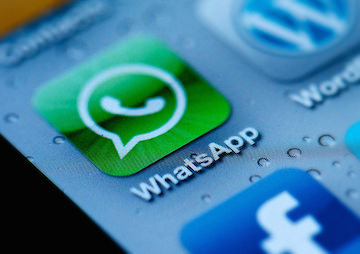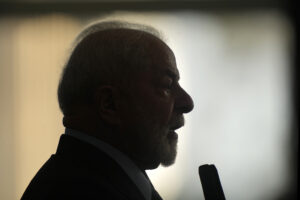WhatsApp Adds Encryption to All of Its Communications
WhatsApp, an online messaging service owned by Facebook, has over a billion users -- and as of Tuesday, any exchanges done via the app will be encrypted. Flickr
Flickr
Another challenger has just added to the debate on government surveillance and privacy rights. WhatsApp, an application providing online services such as messaging and phone calls, announced Tuesday that it is going to encrypt its entire network.
Unlike Apple, which encrypts only iMessages via iPhones, WhatsApp can be used on a wide array of phones and devices, and this latest encryption update will grant privacy to billions of users around the world. The two creators of the app, which is now owned by Facebook, spoke to Wired about their bold move to protect user privacy:
WhatsApp has no way of complying with a court order demanding access to the content of any message, phone call, photo, or video traveling through its service. Like Apple, WhatsApp is, in practice, stonewalling the federal government, but it’s doing so on a larger front—one that spans roughly a billion devices.
“Building secure products actually makes for a safer world, (though) many people in law enforcements may not agree with that,” says [Brian] Acton, who was employee number fourty-four at Internet giant Yahoo before co-founding WhatsApp in 2009 alongside [Jan] Koum, one of his old Yahoo colleagues. With encryption, Acton explain, anyone can conduct business or talk to a doctor without worrying about eavesdroppers. With encryption, he says, you can even be a whistleblower – and not worry.
The timing of this update isn’t accidental. It comes amid heightened public awareness of how encryption can play a role in protecting one’s privacy. The debate between Apple and the FBI is one example of the government’s growing pressure on Silicon Valley. WhatsApp signed on to an amicus brief filed earlier this year in support of Apple. And the release of the Panama Papers earlier this week shows the importance of encryption on a global scale, especially when it comes to protecting whistleblowers.
WhatsApp’s move isn’t without controversy. As Wired states, since the company encrypted some of its communications in 2014, large-scale criminal offenses (such as the Paris attacks late last year) have benefited from the app’s encrypted communication. The app’s makers, however, don’t let that sway them; if anything, the fact that WhatsApp users are overwhelmingly international adds pressure to keep the network encrypted:
Espousing an article of faith that’s commonly held among Silicon Valley engineers—sometimes devoutly, sometimes casually—they believe that online privacy must be protected against surveillance of all kinds. “We’re somewhat lucky here in the United States, where we hope that the checks and balances hold out for many years to come and decades to come. But in a lot of countries you don’t have these checks and balances,” says Koum.
Additionally, says co-creator Koum, any sort of “back door” technology — such as the kind the FBI wanted from Apple—would be pointless. As stated in the amicus brief in support of Apple, the creation of a back-door technology wouldn’t help just hackers but also “countries with less-robust due-process guarantees” that would “demand similar access.”
A recent profile of Andrés Sepúlveda, a political hacker in Latin America, shows exactly the kind of criminal efforts that would be obstructed by encryption (and governments in countries such as Brazil have not had kind reactions to WhatsApp’s popularity).
Although the global government response to this move is likely to be anything but positive, the developers behind WhatsApp don’t seemed concerned. There’s a bigger problem at stake, says Koum, if “the White House thinks that Twitter can solve their ISIS problem.”
–Posted by Emma Niles
Your support matters…Independent journalism is under threat and overshadowed by heavily funded mainstream media.
You can help level the playing field. Become a member.
Your tax-deductible contribution keeps us digging beneath the headlines to give you thought-provoking, investigative reporting and analysis that unearths what's really happening- without compromise.
Give today to support our courageous, independent journalists.









You need to be a supporter to comment.
There are currently no responses to this article.
Be the first to respond.